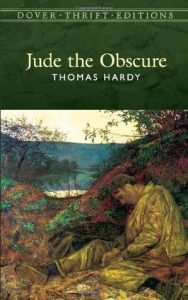I can’t remember when a book grabbed me by the throat quite as forcibly as this one did. Although, of course, I’ve read Jude the Obscure before, I’d forgotten its richness and astonishing forward thinking for a novel which was published in 1896. I read a lot – QED – but it’s rare for me to sit down with a book on a weekday after lunch and still be there as dusk falls. Almost unable to put it down, I did that twice with this wonderful novel.
First a quick, inadequate summary in case it’s new to you. Jude, from a humble background, is a dreamer: studious and bright. He yearns to go to Christminster (Oxford) and become a clergyman. Then his sexual urges get the better of him and he is trapped into marriage by an alluring but totally unsuitable, grasping woman named Arabella. They separate, and he meets someone much more suitable but the going is rarely smooth because 19th century attitudes to marriage, still driven by the church, prevail. Inevitably it ends in tragedy on several levels with some desperately dark incidents along the way.

I was fascinated by the importance of education in this novel. Schooling had been compulsory for only 16 years meaning that from 1880 every child between the age of 5 and 10 (11 after 1893 and 12 after 1899) had to attend school. The Forster Education Act had set up a system of state education 10 years earlier in 1870. The school Mr Phillotson runs, assisted by Sue, is managed by one of the newish School Boards and he attends regional meetings along with his friend Mr Gillingham who runs a similar school nearby. This means that almost all the characters are literate – Jude is able to study the books he sends for. Even Arabella can read and write letters competently. It also means that people like Jude and Sue, despite their backgrounds, can read academic texts and think independently.
What the novel is really about, though, is sexual morality in a patriarchal society and Hardy is exploring some pretty progressive ideas. Both Jude and Sue have been married to people they don’t love. In fact Sue finds the much older Mr Phillotson physically repulsive. So there is an argument that morally they should leave these relationships, irrespective of the demands of vows made in church and pursue the relationship which seems true and honest. Sue for a long time, feels so guilty that although she lives with Jude she refuses to have sex with him – and both their former partners keep reappearing to complicate the issue while Gillingham throws his hands up in horror “By the Lord Harry! – Matriarchy!” Life with Phillotson is sex-free for a long time too until a deeply disturbing self-sacrifice on Sue’s part. The evolving attitude of the widowed Mrs Edlin is interesting too – her own marriage lay in the distant pre-Victorian past and she’s much more relaxed about sexual politics. She tries very hard to persuade Sue to see sense and grab happiness where she can.
At one point before Sue – ever anxiously capricious – succumbs to guilt, regret and self-imposed penance, she says: “I may hold the opinion that, in a proper state of society, the father of a woman’s child will be as much a private matter of hers as the cut of her under-linen.” Jude, meanwhile declares late in the novel that “…the time was not ripe for us! Our ideas were fifty years too soon”. Examples of Hardy’s astonishing prescience come thick and fast – and pulled me up short many times.
Hardy, who was 56 when it was published, was roundly condemned for the “immorality” of Jude the Obscure which was deemed critical of religion, class, sex, education and marriage. He seems to have seen it as a final bolt shot across the bows of the Establishment, because he wrote no more novels. Instead he devoted the remaining 32 years of his life to poetry. That makes him an unusual writer for another reason: a nineteenth century novelist and a 20th century poet.
Next week on Susan’s Bookshelves: The Secret Diaries of Charles Ignatius Sancho by Paterson Joseph